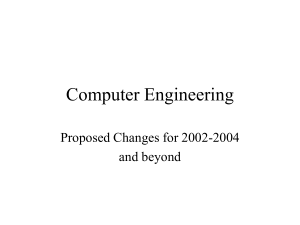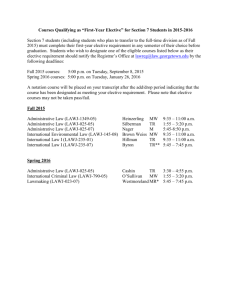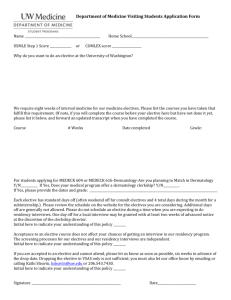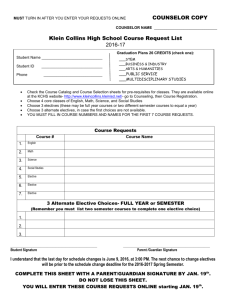PowerPoint - The University of Texas at Austin
advertisement
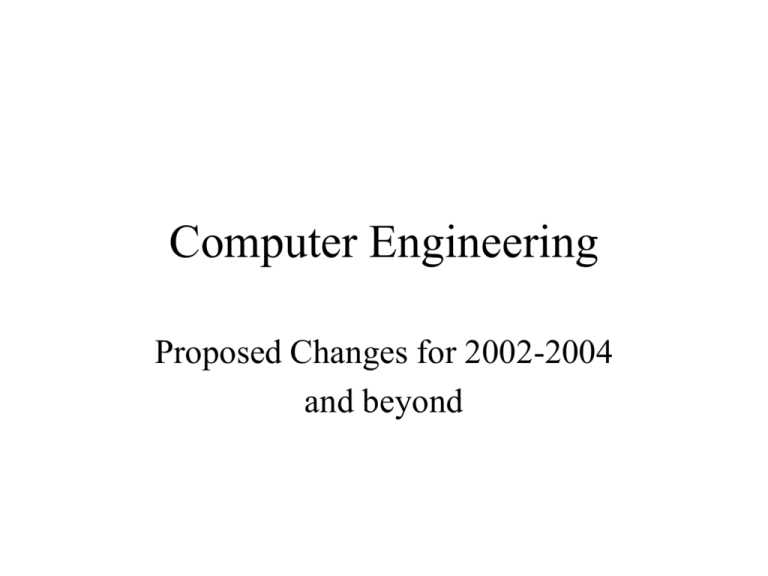
Computer Engineering Proposed Changes for 2002-2004 and beyond The Committee • Committee Membership – Adnan Aziz, Yale Patt, Dewayne Perry, Nur Touba and Craig Chase • Charter – Recommend Changes to the CE Curriculum. Problems To Address 1. Too many required courses, too few electives. 2. Ineffective programming sequence. 3. No (credible) area option for Software Engineering. Split ECE? • The committee felt strongly that EE and CE are highly synergistic. – Both disciplines should be served by the same department. • Computer Engineering needs its own curriculum. – It is unrealistic to expect a student to master both EE and CE in a 4-year program. Software Engineering Curriculum • Software Engineering is an important field of study and should be given thorough treatment within the departmental curriculum. • A new committee should be formed to recommend a SE curriculum. • In the interim, SE will be addressed as a specialty within the CE curriculum. Starting Off on the Right Foot Basic Science and Math • Math and Physics are essential for Engineering, including Computer Engineering. – One full year of calculus, one semester of discrete mathematics. – One full year of physics, including statics, electrostatics and electromagnetism. • No direct justification for chemistry and differential equations. Starting Off on the Right Foot Core Engineering • Freshmen courses – Intro to EE (EE302) and Into to CE (EE306) • Circuits, Signals and Systems are essential. – EE411, EE313, EE438. • Probability and Statistics – EE351K Programming Sequence • We Need a Philosophical Shift – Teach underlying technology – “Bottom-Up” approach, analysis (and experience) before design. • EE306 – Basic Principles of Computation • EE312 – Basic Principles of Programming • EE322 – Developing Software How Does EE312 Change? • Course content should emphasize how things work at the machine level (not on an abstract mathematical level). – Memory management and parameter passing. • Students should learn to debug/analyze programs. • Internalizing is the key to understanding, Understanding is the key to retention. How Does EE360C Change? • EE360C serves two masters – Teaching C++ – Data structures and analysis of algorithms. • EE322 Would address teaching C++ – Common algorithms and data structures would be covered (e.g., C++ STL). • EE360C Would be elective and advanced. Computer Design Sequence • • • • • Improve a good thing. EE306 – Basic Principles of Computation EE316 – Digital Design EE319K – Introduction to Microcontrollers EE345L – Microcontroller Applications and Computer Organization Technical Areas • Students must choose at least one CE area, and one (either CE or EE) other area. • Areas are defined by the area committee. – – – – Computer Design (360N, 345M + one more) VLSI Design (339, 360S, 360R) Software Development (360P, 360C, 360F) Software Systems (Databases, Compilers, Networking) Fall Freshman Year (16cr) • Replace Chemistry 301 with EE306 • Rename/Refocus EE302 English 306 (university requirement) EE 302 Introduction to Electrical Engineering EE 306 Introduction to Computer Engineering Math 408C Differential and Integral Calculus Approved Fine Arts/Humanities Elective (univ rqrd) Spring Freshman Year (17cr) • Redesign EE312 GOV 310L American Government (state rqrd). EE 312 Programming I Math 408D Seq., Ser. and Multivariable Calc. PHY 303K/103M Engineering Phys I (lab) Approved Fine Arts/Humanities Elective (univ rqrd) Fall Sophomore Year (18cr) • Replace EE360C with EE322 EE 411 Circuit Theory EE 322 Programming II Math 427K Advanced Calc. PHY 303L/103N Engineering Phys II (lab) Math 325K Discrete Mathematics Spring Sophomore Year (16cr) • Revise EE319K English 316K (university reqd) EE 313 Linear Systems and Signals EE 319K Microprocessor Programming EE 316 Digital Systems Engineering Approved Technical Elective EE 155 Seminar Changes to the Major Sequence • Eliminate 4 EE courses (325, 321, 338K, 339) and Modern Physics (PHY355). • Make 360P and 360N area courses (not required). • Require EE345L as substitute for EE321K • Require two areas (six courses). EE345L is not an area course. • Add a laboratory to EE338 (becomes 448). Fall Junior Year (16cr) • Add lab to 338, eliminate 325 and 321 EE 438 Electronic Circuits I (lab) EE351K Probability and Statistics Approved Technical Area GOV 312L American Government (state rqrd) Approved Elective Spring Junior Year (15cr) • Require 345L (advanced lab). EE 345L Microprocessor Interfacing Laboratory EE 333T Engineering Communication Approved Technical Area Engineering Science Elective HIS 315K American History (state rqrd). Fall Senior Year (12cr) • Add new technical elective Approved Technical Elective HIS 315L American History (state rqrd) Approved Technical Area Approved Technical Area Spring Senior Year (13cr) • Make 464 Relevant to Technical Area Approved Elective EE 464 Senior Design Project Approved Technical Area Approved Technical Area Curriculum Changes Summary • Total of 123 credit hours (down from 128) • Two technical electives (up from one) • Students must choose two technical areas (EE345L advanced lab is not an area course). Differences With Proposed EE • First two years virtually identical – EE316 (CE) instead of EE325 (EE) – M325K (CE) instead of M340L(EE) • EE has three additional credit hours (126). • EE students have one technical elective and two approved electives (CE students have two of each). – EE requires EE339 and EE362K, there is no corresponding course in CE curriculum Next Steps • Faculty must decide whether to adopt the philosophy behind these proposals. • Subcommittees must be formed to propose specific syllabi for the affected courses. – 312, 319K, 316, 345L, 345M, 322, 360C, 360P

